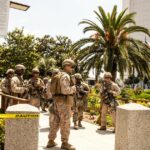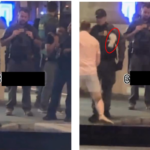In Washington, as the U.S. Military Academy at West Point prepared to bid farewell to its class of 2025, a poignant narrative unfolded that intertwined the paths of past sacrifice and present honor. In an incredibly heartfelt gesture, the graduating cadets chose to celebrate an individual who embodied the values of the academy yet never walked its hallowed grounds as a student. This individual was Peter Wang, a young Army Junior ROTC cadet whose dreams of attending West Point were tragically cut short.
Peter Wang was only 15 when he lost his life during the devastating mass shooting at Marjory Stoneman Douglas High School in Parkland, Florida, in February 2018. Among the 17 victims of that horrific day, Wang distinguished himself through an act of bravery that would posthumously align his legacy with the esteemed values of West Point. During the chaotic and perilous moments of the shooting, he held a door open, allowing his classmates to escape the gunfire. His selfless action did not go unnoticed; however, his life was claimed as he was shot 13 times while wearing his Army JROTC uniform.
Seven years after the shooting, CBS News reported that Wang had been symbolically accepted into the West Point class of 2025, a testament to what his future might have held. As graduation approached for the class, there was uncertainty at the academy about whether Wang would be posthumously awarded his diploma. This oversight seemed to momentarily unsettle the academy’s staff and leadership when pressed by media inquiries. Yet, within the hearts of many cadets, the story of Wang’s valor remained a vivid emblem of courage and sacrifice.
Newly commissioned Army 2nd Lt. Katherine Metz, the president of the class of 2025, expressed her surprise when she discovered how deeply Wang’s story resonated with her peers. “When we put out a form asking for classmates to nominate honorary members of our class, I was not expecting Peter Wang’s name to be on the list of nominees,” Metz told CBS News. Despite many cadets nominating peers separated from their studies due to medical reasons or impactful foreign exchange cadets, Wang’s name appeared repeatedly, cementing his place in their memory.
Moved by the collective sentiment of her class, Metz, along with other cadets, lobbied for Wang to receive the Honorary Graduate Award. This recognition is granted to individuals who, though not physically graduating, profoundly embody West Point’s core values: duty, honor, and country. The decision to honor Wang posthumously thus became an integral part of graduation proceedings.
In the moments that carried heavy gunfire back in 2018 at Marjory Stoneman Douglas High School, Wang had been in study hall. Rather than fleeing, he chose a path of sacrifice. His actions not only exemplified the courage that West Point upholds but also ensured that his spirit would endure in the ethos of the academy. This narrative deeply touched his would-be peers, reinforcing a collective identity steeped in valor and sacrifice. Wang’s brave act was celebrated during the graduation week, as his story transformed from one of individual heroism to a shared legacy of selflessness cherished by all graduates.
Metz announced Wang’s honorary membership before her fellow cadets, a declaration that underscored the unity and respect fostered among the graduates. Despite many only learning of Wang’s full story during the ceremony, his legacy quickly became a cornerstone of the class’s identity—an enduring reminder of the profound impact one individual can have.
Wang’s valor did not go unrecognized even beyond West Point. He was posthumously awarded the Medal of Heroism by the U.S. Army, the highest honor for Army JROTC and ROTC cadets, which is bestowed for actions that significantly involve danger and extraordinary responsibility. This commendation, also awarded to fellow JROTC cadets Alaina Petty and Martin Duque who perished in the same tragedy, marked a solemn acknowledgment of their heroism.
Retired Lt. Gen. Robert Caslen, who was the superintendent of West Point in 2018, personally authorized Wang’s honorary acceptance into the class of 2025. He reflected on Wang’s actions, noting that such characteristics are precisely what the academy seeks in its leaders. “Individuals like Peter are exactly the men and women you want leading America’s youth in combat situations. The fact that he demonstrated that at his age says a lot about him which is why we made him an honorary member of the class,” Caslen stated.
This gesture by the U.S. Military Academy at West Point to honor Peter Wang posthumously not only commemorates a young hero but also serves as a profound reminder of the values that the institution upholds. It demonstrates a recognition and celebration of courage, duty, and sacrifice—principles that define the spirit of the academy and its graduates as they step forward to serve with honor and distinction in the U.S. Army. As these new officers embark on their careers, they carry forward not just the knowledge and training acquired at West Point, but also the inspiring legacy of a young man who, in his final moments, exemplified the very essence of selfless service.









